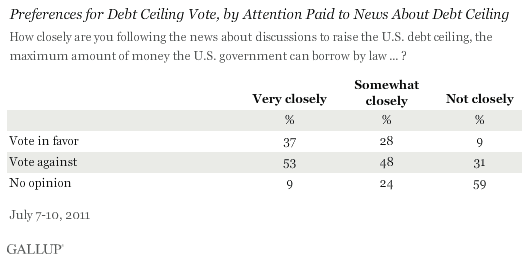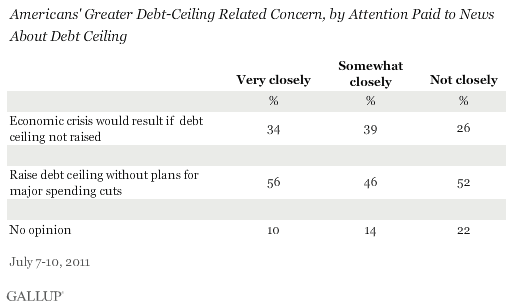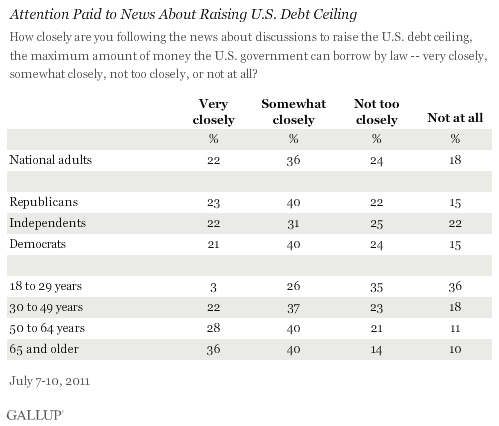PRINCETON, NJ -- Echoing resistance to raising the nation's debt ceiling among the public at large, 53% of Americans who say they are following the issue very closely in the news want their member of Congress to vote against raising the debt limit, while 37% urge a vote in favor.

This 16-percentage-point margin against raising the debt limit among the most attentive Americans is similar to the 20-point margin among those following the matter somewhat closely, 48% vs. 28%. Those not following the issue closely are also more likely to want their member of Congress to vote against raising the debt limit than for it; however, the majority, 59%, have no opinion.
Similarly, the Americans most attentive to the debt ceiling issue are no more anxious about the potential negative economic fallout should the debt ceiling not be raised than are those paying less attention to the issue. The majority of those following the issue very closely say they are more worried that the government would raise the debt ceiling without plans for major cuts in future spending than they are that not raising the debt ceiling would result in a major economic crisis.

Attention Paid to Debt Ceiling Debate Is About Average for a News Event
Nearly 6 in 10 Americans, 58%, say they are following the news about discussions to raise the U.S. debt limit either very or somewhat closely. This approximates the 57% paying close attention in May and is about average for the more than 200 news stories Gallup has rated since 1991. Republicans and Democrats are paying similar levels of attention, while independents are tuned in slightly less closely.
Much greater differences are seen by age, with 76% of seniors and 68% of those aged 50 to 64 paying close attention to the debt ceiling story, compared with 59% of those 30 to 49 and 29% of those 18 to 29. This is typical for age patterns regarding attention to the news.

Bottom Line
Americans' general opposition to raising the nation's debt ceiling limit -- at least in the abstract -- does not primarily reflect low public awareness of the president's warnings about the perils of not raising it. In fact, the majority of Americans who say they are following the issue very closely oppose it, and are more concerned about the impact that raising the debt limit would have on future U.S. deficit spending than the possibility of an economic crisis if it is not raised.
In trying to win more public support for raising the debt ceiling, President Obama appealed to seniors Tuesday, warning that failure to do so could put a freeze on Social Security checks as soon as Aug. 3. Obama's approval rating among seniors is currently at 39%, the lowest of any age group. However, seniors are also the age group paying closest attention to the deficit issue and might be persuaded to rethink their position on the debt ceiling (currently 26% are in favor of raising it and 48% opposed) if they believe their retirement income is at risk.
Survey Methods
Results for this Gallup poll are based on telephone interviews conducted July 7-10, 2011, with a random sample of 1,016 adults, aged 18 and older, living in all 50 U.S. states and the District of Columbia.
For results based on the total sample of national adults, one can say with 95% confidence that the maximum margin of sampling error is ±4 percentage points.
Interviews are conducted with respondents on landline telephones and cellular phones, with interviews conducted in Spanish for respondents who are primarily Spanish-speaking. Each sample includes a minimum quota of 400 cell phone respondents and 600 landline respondents per 1,000 national adults, with additional minimum quotas among landline respondents for gender within region. Landline telephone numbers are chosen at random among listed telephone numbers. Cell phone numbers are selected using random-digit-dial methods. Landline respondents are chosen at random within each household on the basis of which member had the most recent birthday.
Samples are weighted by gender, age, race, Hispanic ethnicity, education, region, adults in the household, and phone status (cell phone only/landline only/both, cell phone mostly, and having an unlisted landline number). Demographic weighting targets are based on the March 2010 Current Population Survey figures for the aged 18 and older non-institutionalized population living in U.S. telephone households. All reported margins of sampling error include the computed design effects for weighting and sample design.
In addition to sampling error, question wording and practical difficulties in conducting surveys can introduce error or bias into the findings of public opinion polls.
For more details on Gallup's polling methodology, visit www.gallup.com.
